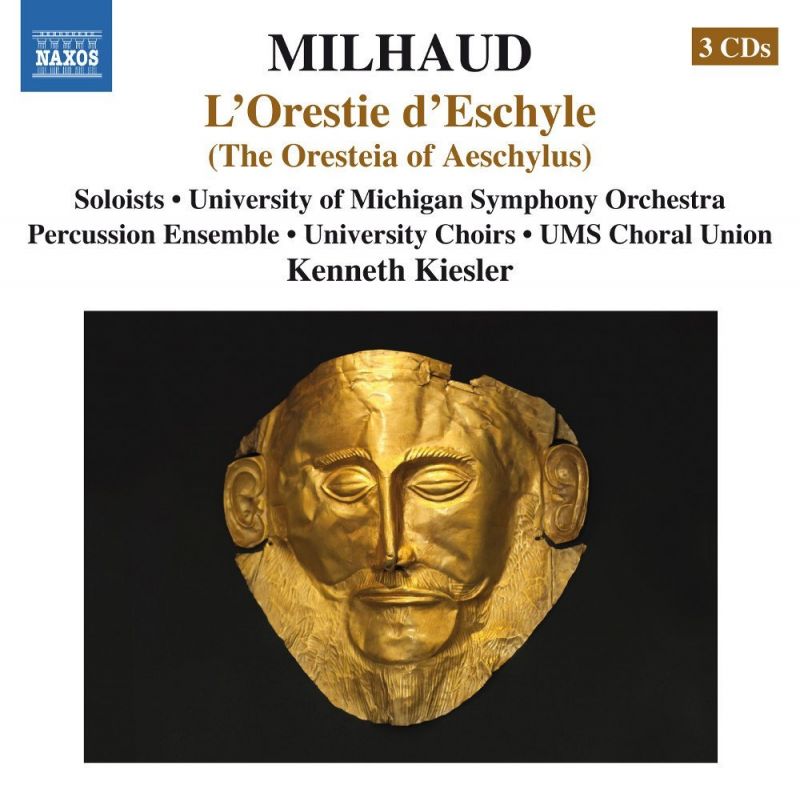MILHAUD L’Orestie d’Eschyle
View record and artist detailsRecord and Artist Details
Composer or Director: Darius Milhaud
Genre:
Opera
Label: Naxos
Magazine Review Date: 02/2015
Media Format: CD or Download
Media Runtime: 141
Mastering:
DDD
Catalogue Number: 8 660349/51

Tracks:
| Composition | Artist Credit |
|---|---|
| L’Orestie d’Eschyle |
Darius Milhaud, Composer
Brenda Rae, Athena; A Slave Woman, Soprano Dan Kempson, Orestes, Baritone Darius Milhaud, Composer Jennifer Lane, Athena, Contralto (Female alto) Julianna di Giacomo, Pythia, Soprano Kenneth Kiesler, Conductor Kristin Eder, Electra, Mezzo soprano Lori Phillips, Clytemnestra, Soprano Michigan State University Chamber Choir Michigan State University Choir Michigan State University Percussion Ensemble Michigan State University Symphony Orchestra Sidney Outlaw, Apollo, Baritone Sophie Delphis, Leader of the Slave Women, Speaker Tamara Mumford, Athena, Mezzo soprano UMS Choral Union |
Author: David Patrick Stearns
The saga unfolds in tandem with Milhaud’s creative development throughout his twenties between 1913 and 1923, and becomes part of the larger narrative. Earliest parts – ‘L’Agamemnon’ and second instalment ‘Les Choéphores’ (‘The Libation Bearers’) – tend towards ostinato-driven modules, giving way to more sweeping through-composed music and considerable rhythmic savagery.
Though endlessly inventive, solo vocal writing is confined to a narrow chant-like range. The most distinctive passages of ‘Les Choéphores’ dispense with singing completely, with aggressive chant accompanied only by percussion. Though the rest of the saga is indeed sung, such chanting seems to be the composer’s inner point of reference. It’s a monster of a piece, this first recording of the whole thing owing its existence to William Bolcom, a Milhaud student in the 1950s who no doubt realised that the only hope for a modern revival was the kind of combined forces offered by the University of Michigan (where he’s faculty composer).
The steep vocal and dramatic challenges of L’Orestie are indeed met, not always spectacularly, but with more authority than the 1960 ‘Les Euménides’ archival recording from the Institut National de l’Audiovisuel conducted by Charles Bruck (INA Archives, available on qobuz.com), or Leonard Bernstein’s choral forces in his 1961 ‘Les Choéphores’ (Sony, 10/97). The Michigan soloists are good to excellent, especially Kristin Eder as Electra (a more lyrical incarnation than Strauss’s). Choruses do well with the French language and the orchestra shows occasional signs of labour (to be expected), though everyone sounds mightiest amid the most challenging polytonal sections of ‘Les Euménides’.
Igor Markevitch’s 1957 ‘Les Choéphores’ recording (DG, 5/58, 4/97) – with its insistently muscular orchestral sonorities, aggressive sense of rhythm and greater immediacy in the recorded sound – suggests just how compelling L’Orestie could be. But as it stands, the present recording is much more than a stopgap, and hopefully the beginning of a long-delayed performance life of a work that speaks vividly to our times.
Discover the world's largest classical music catalogue with Presto Music.

Gramophone Digital Club
- Digital Edition
- Digital Archive
- Reviews Database
- Full website access
From £8.75 / month
Subscribe
Gramophone Full Club
- Print Edition
- Digital Edition
- Digital Archive
- Reviews Database
- Full website access
From £11.00 / month
Subscribe
If you are a library, university or other organisation that would be interested in an institutional subscription to Gramophone please click here for further information.




